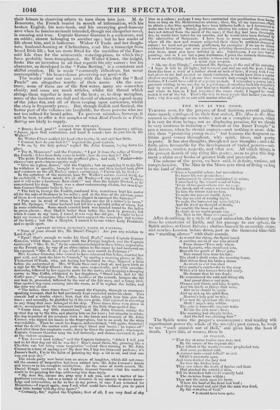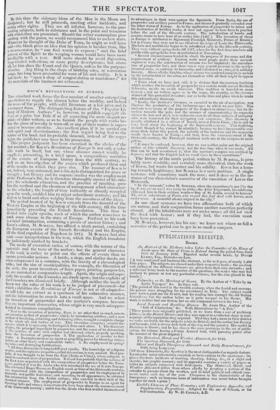TIIE MAN IN TILE MOON.
TURNING over, for the purpose of final decision, several publics- dons merely catalogued on their first arrival, The Man in the Mon seemed to challenge some notice ; not as a complete poem, which it is very far from being ; not as displaying promise, for we should be very cautious in inducing a " Student of the Inner Temple to pen a stanza, when he should engross—and nothing is more delus sive than " promising young men ; " but because the fragment ex- hibits good verses throughout, with spirit, ideas, and poetry in parts. It has also thoughts, though not new thoughts ; and a de- finite plan, fiwourable fbr the development of varied powers—sati- rical, severe, tender, majestic, and what BOI. All which things, in the present dearth of any thing like poetry, seem to give this frog- ment a claim over books of greater bulk and pretension. The scheme of the poem, we have said, is definite, various, anti comprehensive. The Man in the Moon gets tired of living so long in the land of dreams.
'Twas a beautiful sphere, but nevertheless Its lunar life was passioaless :
tnehequereui by sorrels., undimmed by crime,
totouelied by the wizard wand of time,
"bras all too good—there was no scope For dread, and of course no room fin. hope :
To him the future had no fear, To make the present doubly dear ; The day no cast of' coining night, To make the borrowed ray more bright ; And life itself no thmusht of death, To sanctify the boon breath: In short, as we world-people say,
The Man in the Moon WaS ennup:." After describing, in a style of equal annnation, the visionary no. tiom he entertains of Earth, and his passage to our sphere, the
Spirit arrives at Great Britain ; clothes himself in an earthly shape;
and reaches London before dawn, just as the thousand time-hclis
are " startling silence" with their sounds.
" As ceased the chime, the Spirit heard
A rustling sound of one who stirred From sleep—'Twas only where Some Lazarus, who slumbered late, Beneath the porch of Dives' gate, Had roused him from his lair; The clock's shrill voice, the morning beam, Had driven from his brain a dream As sweet as e'er was shed O'er martyr's couch—fur in the sleep Which o'er him hunger-born did creep, He dreamt that he was dead ;
He remembered the cold and biting air,
And gaunt disease and pain,
Hunger and thirst, and lung despair,
And life itself, as things that were, But ne'er should be again.
And up and up his spirit flies, Heaven's holy gate to win ;
E'en now its splendour fills his eyes;
lark angels sing within.
The gate is won—the vagrant woke
Beside the rich man's door; The morning had already broke, And the bell was chiming four." The Spirit scans time pauper's countenance; and reading with superhuman power the whole of the wretch's past career, he weeps to see " such anguish out of Hell," and gives him the boon of
death. -Upon this, of course, there is
AN INQUEST.
" That day at noon twelve men were met By the corpse of the vagrant old: They talked of the weather—some prophesied wet, And some predicted cold.
A corolla came—and talked* as erst
Of life's uncertain span, And then desired the jury first
To view the lifidess man.
They saw where the teeth of famine and frost
Had pinched the wrinkled skin, Till its shrunken fold could scarcely hold The skeleton frame within ; They saw the mark upon his brow, 11 here the hoof of the fiend had trod ;
And they turned and said that the man was dead,
By the visitation of God."
• 11 should have been spoke.
■ ••••
By this time the visionary ideas of the Man in the Moon are dissipated; but he still proceeds, meeting other incidents, and seeing other sights. They are all inferior, however, to the pre- ceeding subjects, both in substance and in the point and terseness with which they are presented. Should the writer contemplate pro- ceeding with the poem, we would recommend him to eschew stars. Whatever he thought of the Duke of YORK, he might as well have said—the blank gives an idea that his opinion is harsher than, like a tavern-orator, he " can find words to express :" and the brief ssnon of the Spirit to the weeping woman would have been more intelligible with a text. Still more should he avoid digression, ion,,.winded reflections, or mere pretty descriptions ; but above all, let him shun the .Court and the Queen, unless for the purposes ofsatire. Any thing in the shape of birthday odes, or coronation songs, has long been proverbial the want of life and reality. It is a had trade to "open a shop of congratulation or condolence ;" for the materials of the business are exhausted.



























 Previous page
Previous page